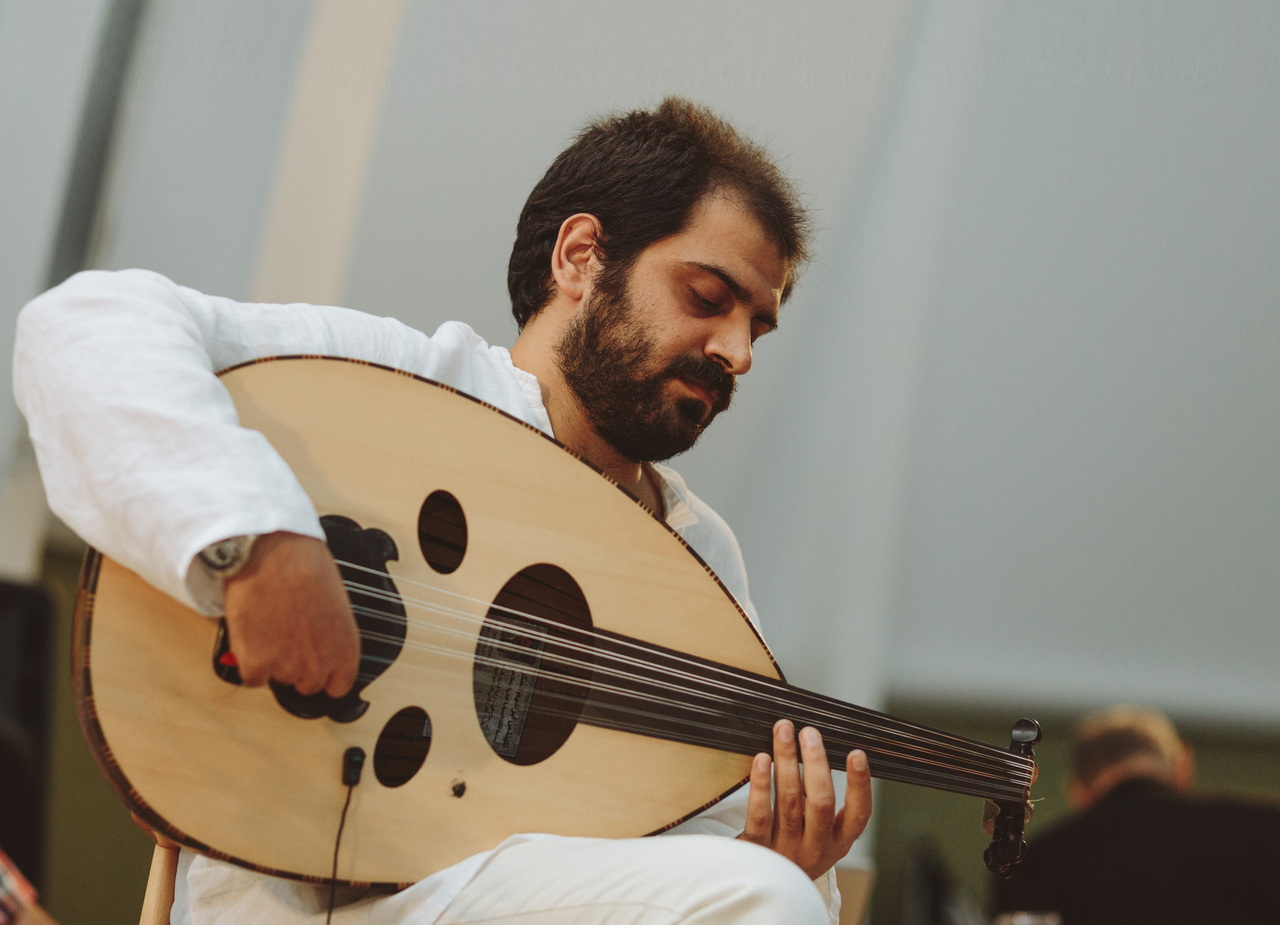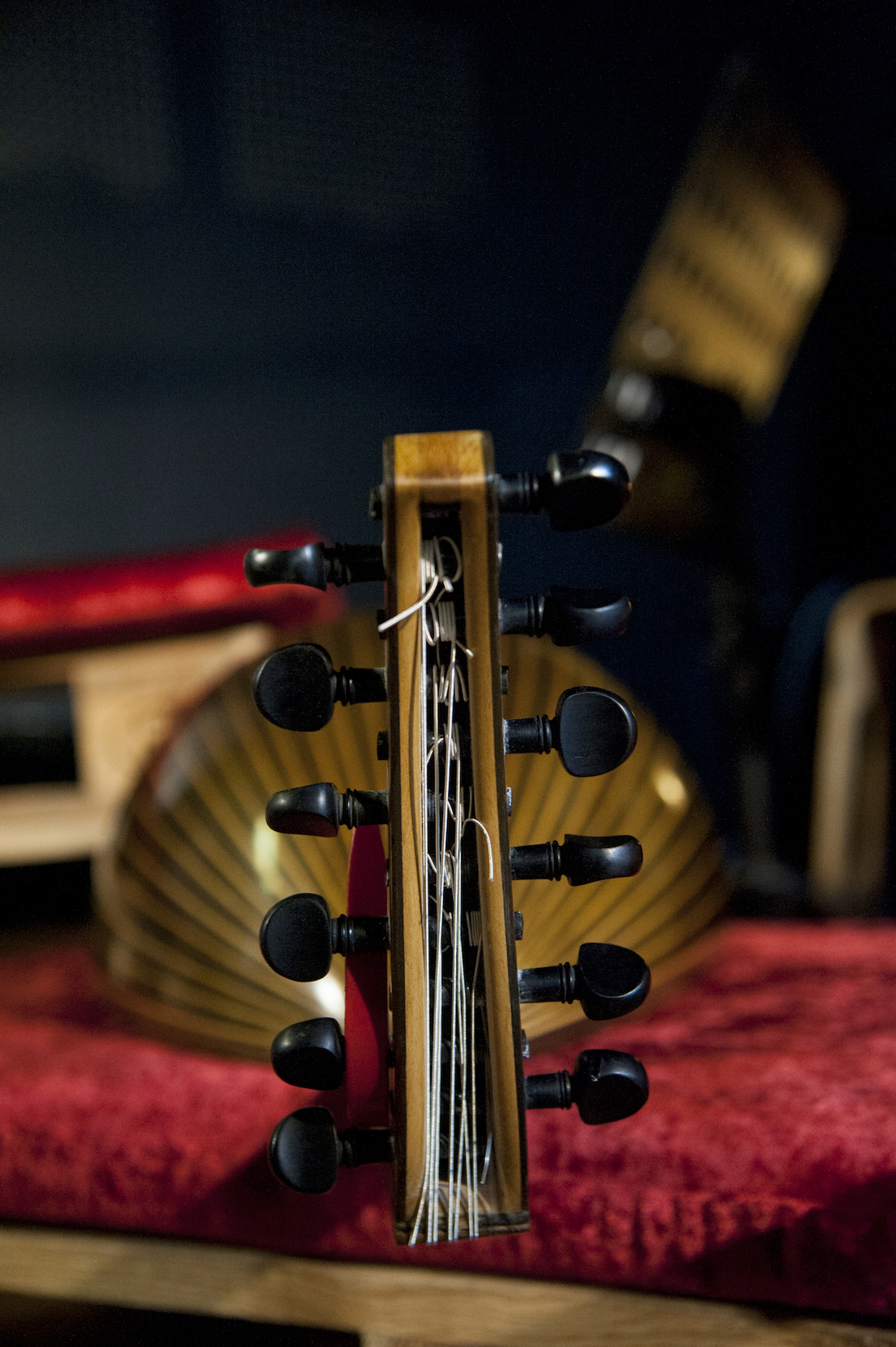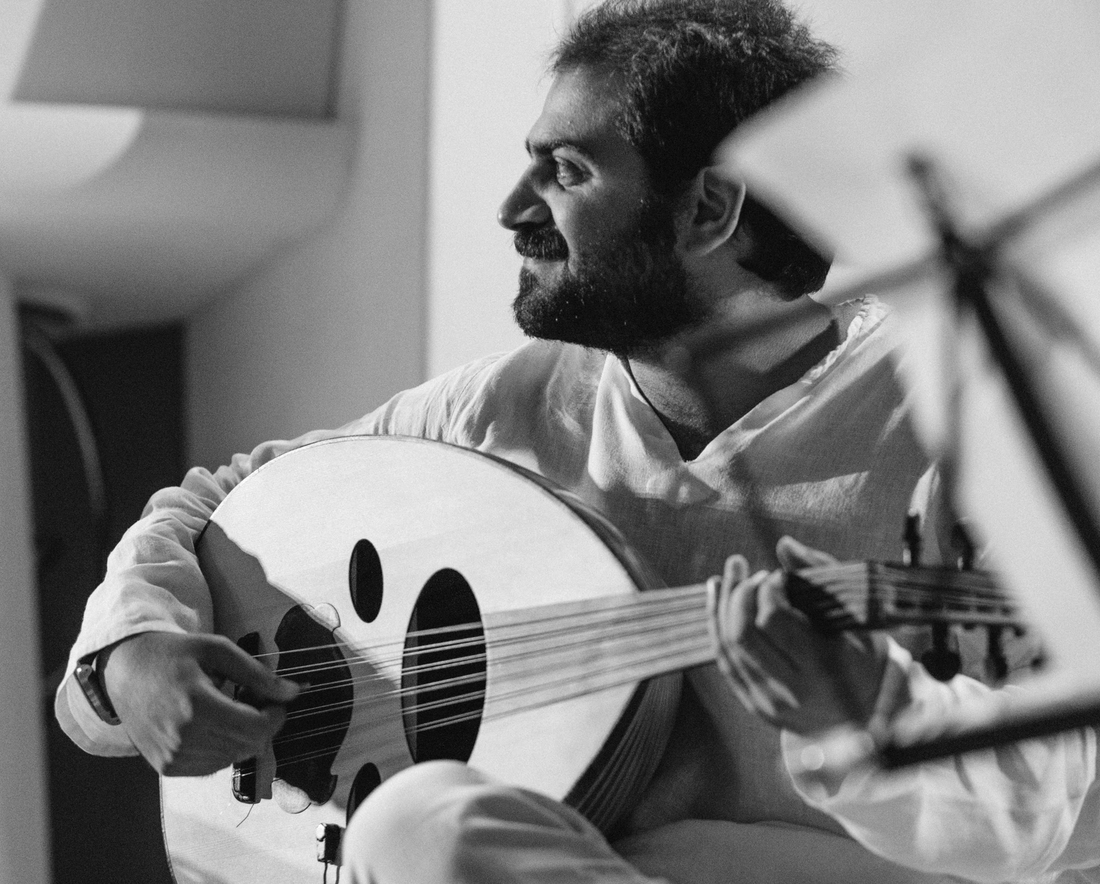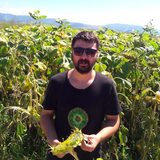With all these fleeting thoughts running through my mind, I was rushing on a warm summer night through the alleys of Cișmigiu Park in Bucharest to meet Mohamad Zatari, one of the very few Syrian musicians living in Romania that I know about.
I heard of Zatari some years before meeting him in person, particularly from
Quieter Than Silence, a project he developed with the Iranian musician Mehdi Aminian. We had met a few weeks before he played at this year’s
Outernational Virtual Festival alongside Romanian/Indian percussionist Avadhut Kasinadhuni and Iranian Tar player Sara Nezamoleslami.
Zatari is a composer and oud player from Aleppo, Syria. His artistic effort is devoted to deconstructing stereotypes, blending various musical genres, and as he puts it, “to constantly look for new musical ways of inspiration”. He has been taught traditional and regional music by
Tareq Al-Sayed Yehya, and he is currently pursuing a bachelor's degree in classical composition at the National University of Music Bucharest. Many of his compositions were used for short films, different visuals, as well as educational materials. He also performed in many countries such as Syria, Romania, Hungary, Germany and Austria.
He combines classical and contemporary music in a remarkable way, choosing from different types: traditional Levantine, Iraqi, Turkish and Egyptian music, in addition to Occidental music. Zatari is very keen on developing his own style constantly, meeting musicians from different backgrounds and combining different elements from West Asia & North Africa. He moved to Bucharest over seven years ago.
“I arrived in Romania through an invitation from a Romanian friend”, Mohamad tells me, while we sip from some cold beverages. Nearby our table, the infamous Cișmigiu peacocks are shouting, using all sorts of strange and loud noises. Maybe they are disputing their own condition, their own identity.
“What I miss in Bucharest is the mixture of flavors and smells that I used to encounter in the markets (souks) of Aleppo or which you can find in the markets in Istanbul as well. The smell of halva, spices, soap etc. Before coming here, I had lived in Saudi Arabia for almost 5 years. I came to Romania to study music at the Conservatory of Bucharest. I wanted to study and make music where I was in the Middle-East, but I didn't feel safe and secure in the country where I was living. Apart from war, revolution, the Arab Spring, you don't feel safe there, you are besieged either by collective social principles that you have to abide by, or by bloody authorities that control your life permanently.”
He adds that his parents weren't supportive of his music making, but this had no impact on Mohamad’s unwavering choice; by the age of 14, he already decided that this was what he wanted to do – music. “My mother was very conservative and religious, she considered music to be a sin. My father was a simple worker (painter) coming from a proletarian family. He wanted me to be successful and to be able to cater to my own household in the future.”
When he was around 13 years old, Mohamad began to question his religious faith and came to be influenced by the communist theory. He used to listen to revolutionist music in his bedroom, which had a poster of Karl Marx on one of its walls.
“Revolution-based music in the Middle East is based on popular culture. Its lyrics and musical forms are accessible and understandable by everyone, having, of course, the sense of revolt. It gets influenced by the socio-political situation as well as musical trends and influences. What is revolutionary now as a music genre is totally different from what it was 20 years ago. For example,
Sheikh Imam, an Egyptian traditional singer, formed a duo with the poet
Ahmed Fouad Negm. They used to tour around the Arab world holding an oud and a percussion, mostly a Riq. These guys were always imprisoned because of their songs. In contrast, it's going more nowadays into alternative rock, trap, even electronic instrumental music and so on. I think this change in what is viewed as revolutionary is ascribed also to the availability and the prevalence of Internet and media. Furthermore, voices denouncing racism, discrimination and advocating equality should have played certain roles in changing perspectives. Moreover, the political context is different now. Supported by the Soviet Union, socialism was dominant in countries like Egypt, Syria, Iraq, Libya and Palestine. However, these influences still have their residues in the area. Anyway, being an artist in a patriarchal society, you are kind of censored by both the society and the authorities. Authorities would either get you imprisoned or ban your works if you criticize them (
Military Intelligence Directorate, the president etc). On the other hand, people would protest against a kissing scene in a movie, or for criticizing a religious concept.”
Folk music of Syria is for the most part based on the oud (a stringed instrument considered to be the ancestor of the European lute), as well as the Ney and hand-held percussion instruments, such as the Darbouka, Daf or Riq. Other typical instruments are the Qanun and the Arabic violin.
“I listened to oudists (oud performers) at the age of 14; I had a brother from whom I took this while listening to rebellious music. At the same time my brother was in the army for the mandatory service. There he had a friend, a musician, and he secretly bought an oud. Even if I was telling him I wanted to play the oud, he didn't tell me he already had this instrument. I was preparing for the capacity test at the time, and my parents kept telling me that I had to learn to be prepared for the exam. Eventually my brother gave me his oud and I started learning on my own. I was at a fine arts school where I met professional musicians and since then I started meeting with them every day, this being the way I learned to play the oud. It's an older way of learning, where a mentor teaches you music, philosophy and morals; that's how I learned to play, with the help of my friends and colleagues.”
Speaking of contemporary music of Syria, the well-known case of Omar Souleyman inevitably occurs in the conversation. The famous Syrian wedding music singer conquered the Western world within the past decade with his contagious contemporary dabke music, releasing his only cassettes for years. In fact, dabke is a large tradition in Syria, being refered to as a native Levantine folk dance. The etymology of 'dabke' is quite uncertain, but it is thought to be derived from the Levantine Arabic word dabaka (Arabic: دبكة) meaning "stamping of the feet" or "to make a noise". The dabkeh jumps may have originated in ancient Canaanite fertility rituals related to agriculture, chasing off evil spirits and protecting young plants. There are numerous kinds of songs that are sung during and specifically for dabke, by both men and women respectively, depending on the occasion, song, and audience. Some of the most popular of these songs, such as
Dal Ouna (دلعونا),
Al Jafra (الجفرا),
Al Dahiyya (الدحية) and
Zareef il-Tool (ظريف الطول), are actually entire genres in themselves, meaning that lyrics can vary depending on each performance, but the basic rhythm of the music remains consistent and recognizable.
“I'm listening to Omar Souleyman and I'm not ashamed at all”, Zatari says, smiling candidly. “Usually you are stamped that you do not listen to classical music, or European, Arabic, Indian. But I like it! In his own way, Omar Souleyman is a character with his moustache, but I don't think he's taken seriously by the artistic community. It's more of a product.”
I remember about
an interview I did with Sir Richard Bishop back in 2015, and at some point Souleyman appeared in the conversation. “I don’t know how Omar Souleyman got to where he got. The first couple of tours in Europe and US, through Sublime Frequencies - at that time, he was just new. People liked the look of him, maybe more than his music; the sunglasses, the attitude, the moustache. And then, when another label -kind of - kidnapped him, this other label and the people behind it just had a lot more money. They had a machine, big industry. And Omar falls into money. He likes money, just like we all do. In Syria, you could see these wedding videos on YouTube with him, when he does the weddings and people throw tones of money. I guess the money goes to him, I don’t know. But I think he does quite well now. And he’ll just keep doing that, until nobody gives him any money anymore, I think.”





